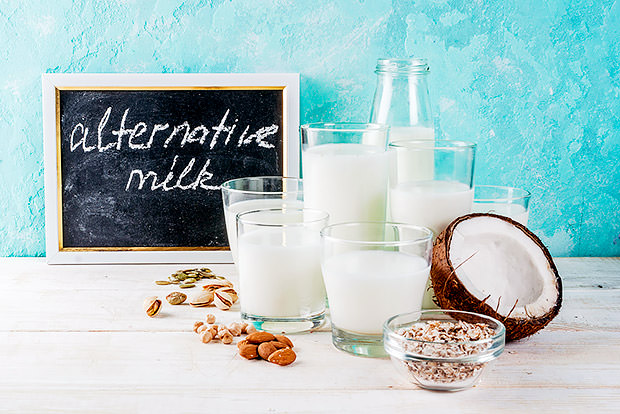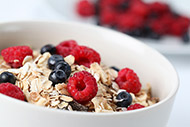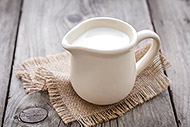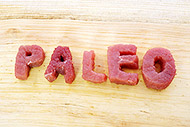
Milk allergies, lactose intolerance, and animal welfare concerns prevent many people from consuming dairy products. While you can meet your nutritional needs without dairy, it's important to pay attention to the nutrients you may lose when cutting dairy from your diet. Identify alternative dairy products that supply these nutrients without adding unwanted ingredients.
Low in added sugars
Dairy contains the natural sugar lactose, but unless it’s flavored, it does not have added sugars (sugar added during processing). It’s important to check food labels closely to ensure these alternative milks aren’t loaded with added sugar. Flavored milk can indicate added sugar, but some varieties, such as unsweetened vanilla, are available.
Protein-rich
One cup of skim milk contains 8 grams of protein. While soy milk has nearly as much, with 6 grams of protein per cup, a cup of almond milk has much less, with only 1 gram of protein. If you rely on dairy for protein, increasing your protein intake from other sources may be important. Nuts, seeds, beans, and poultry are all sources of lean protein.
Contains calcium
Dairy has long been associated with supplying valuable calcium, but other foods also supply this mineral. Aim to add more foods to your eating plan that are natural sources of calcium. A cup of cow’s milk provides about 300 milligrams, and one cup of yogurt contains about 400 milligrams. Alternatively, one cup of cooked collard greens contains about 266 milligrams, and a half cup of almonds contains about 122 milligrams.
Promotes digestive health
Most yogurts are known for containing live and active cultures that are used during fermentation. These cultures are associated with gut health and improved digestion. Fortunately, this health benefit is not limited to dairy yogurts. Soy yogurts and other lactose-free yogurts can also contain live and active cultures. The food label should indicate whether or not these cultures are present.



 3 Healthy Lunches for Your Work Week
3 Healthy Lunches for Your Work Week
 5 Tips for Stretching Your Budget for Healthy Food
5 Tips for Stretching Your Budget for Healthy Food
 Best Ways to Reduce Added Sugar
Best Ways to Reduce Added Sugar
 Healthy Tips to Lighten Up Picnic Foods
Healthy Tips to Lighten Up Picnic Foods
 Do You Need to Drink Milk?
Do You Need to Drink Milk?
 Tips to Keep Track of Water Intake
Tips to Keep Track of Water Intake
 What Is a Paleo Diet?
What Is a Paleo Diet?
 Eating to Build Muscle
Eating to Build Muscle

 Pinterest
Pinterest RSS Feed
RSS Feed